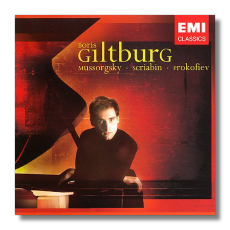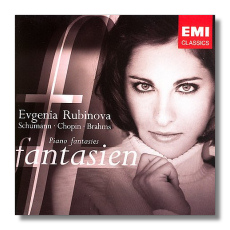
The Internet's Premier Classical Music Source
Related Links
- Latest Reviews
- More Reviews
-
By Composer
-
Collections
DVD & Blu-ray
Books
Concert Reviews
Articles/Interviews
Software
Audio
Search Amazon
Recommended Links
Site News
 CD Review
CD Review
Russian Piano Virtuosos

- Modest Mussorgsky: Pictures at an Exhibition
- Serge Prokofieff: Piano Sonata #8, Op. 84
- Alexander Scriabin: Piano Sonata #2 in G Sharp minor "Sonata-Fantasy", Op. 19
Boris Giltburg, piano
EMI Classics 353232-2 DDD 73:58


- Robert Schumann: Kreisleriana, Op. 16
- Frédéric Chopin: Fantasie, Op. 49
- Johannes Brahms: 7 Fantasien, Op. 116
Evgenia Rubinova, piano
EMI Classics 353234-2 DDD 75:30
Here come more Russian piano virtuosos, although Boris Giltburg has lived in Israel for most of his life. He began playing when he was five, and he was won numerous awards, including (while he still was in his single digits) one at the 1993 International Senigallia Piano Competition in Italy. One of his more recent coups was the Vendôme Prize in 2003. He continues to study with Arie Vardi.
Giltburg's first teacher was his mother. I don't know if she too was Russian born, but there's much about his playing that suggests the Russian school. The Mussorgsky, which opens the program, is not as impressive as the Scriabin and the Prokofieff. In fact, some of Pictures at an Exhibition is downright prosaic, and there's not enough variation in weight and color from picture to picture, such as we hear from Evgeny Kissin, for example. Still, the technique is solid, and all that really seems to be lacking is seasoning, in both senses of the word.
Scriabin's "Sonata-Fantasy" provides welcome contrast, and here Giltburg seems to be on more congenial ground. This is both an extended nocturne and a seascape, and Giltburg sensitively shapes its softer, more impressionistic outlines, evoking not just Chopin but Debussy. Scriabin can be tricky to pull off – he tends to be all over the place – but Giltburg's performance here is more convincing than many. Best of all is the last of Prokofieff's three so-called "War Sonatas." This work is a fine example of Prokofieff's taste for ambiguity, which sometimes rivaled even Shostakovich's. Is the sonata's last movement "buoyant, even playful" (in the words of annotator Jeremy Siepmann), or was the composer up to something more sinister here? Giltburg lets the listener decide for himself, and yet one cannot call this playing overly literal. Giltburg sparkles his way through Prokofieff's spiky, cascading melodies and punches out the hard, unexpected accents. The dreamlike passage near the movement's end is hypnotically done. In the coda, Prokofieff's repeated notes are given machine gun-like force and accuracy. Giltburg's reading of this sonata is among the best I've heard. EMI's recording is decent, if a trifle hard.
Evgenia Rubinova, another Russian, was born in Tashkent, started playing at four, and at 14 moved to Moscow to continue her studies. In 1999 she moved to Germany, where she studied with Lev Natochenny. Her contribution to the EMI's booklet note includes the following interesting statement: "Although I have won prizes at some major piano competitions, such as Leeds (Silver), Città di Cantù, and Casagrande, making music was and remains the most important focus of my artistic efforts." While her words might seems a trifle defensive at first reading, they imply that making music and winning competitions are two separate activities, and perhaps they are! I know that I'd rather hear a musician than a prize-winner. (On Rubinova's website, BBC 4 Television is quoted as commenting, "Rubinova is beyond competition prizes.")
Rubinova is definitely a musician. Like Giltburg, she plays in a typically Russian style, but she leaves the listener with a completely different impression. If Giltburg's playing seems a little unvaried at this point, Rubinova's is most excitingly all over the map. The opening of Kreisleriana, for example, tingles with nervous energy, and is daringly played. Between the two pianists, she seems to be the one with greater physical power at her call. In the middle of the work, in its most intimate sections, however, Rubinova pulls in all of her feelers and creates a beautiful stillness, almost denying the existence of listeners other than her. Few pianists articulate Schumann's quirky rhythms as cleanly as she does (try the beginning of the Sehr lebhaft section), although her insistence on this sometimes creates the impression that she is running through an étude, not a fantasy. We know your technique is great, Evgenia – you don't need to rub our noses in it!
The Chopin has many nice moments, although Rubinova's traversal of the piece's length and breadth feels sectionalized ("now I am going to do this… now I am going to do that") rather than held together by the same backbone. The pianist's excitability makes for provocative Brahms, however. As in the Schumann, extremes are emphasized. There's not a dull moment among these seven Fantasies (three Capriccios and four Intermezzos, to be exact), and Brahms' usual ruggedness has been replaced, at least in part, by a more calculating attitude. This isn't for everyone, but I'd say it's a success overall. Rubinova already is a very interesting pianist, and I look forward to more in this vein.
The sound on Rubinova's CD is slightly more giving than on Giltburg's, although the production team and the recording venue (Potton Hallin Suffolk) are identical.
Copyright © 2006, Raymond Tuttle




















